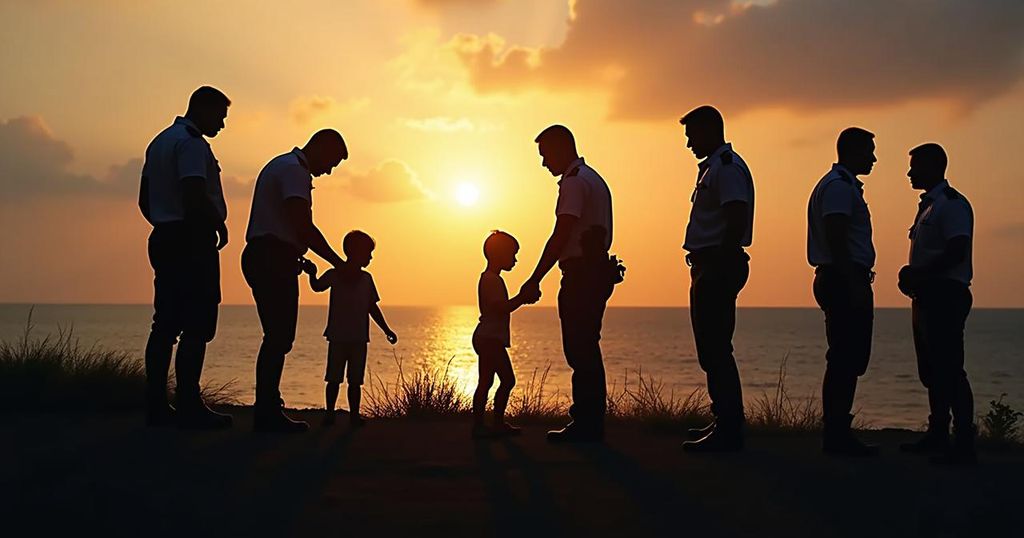Dominican Republic Initiates Mass Deportations of Undocumented Haitians Amid Ongoing Crisis
The Dominican Republic plans to deport 10,000 undocumented Haitians weekly, citing excessive migrant populations and ineffective international intervention in Haiti’s ongoing crisis. This action reflects a firm stance by President Luis Abinader’s government on immigration policies while addressing safety and stability concerns. The plan will significantly exceed previous deportation numbers and comes alongside efforts to combat human trafficking and enhance border surveillance.
The Dominican Republic has announced a new policy that will result in the deportation of 10,000 undocumented Haitians per week, amidst escalating migration from its neighboring country plagued by gang violence and turmoil. According to presidential spokesman Homero Figueroa, the initiative is part of a broader crackdown aimed at decreasing what he described as “excessive migrant populations” in Dominican communities. The operation is set to commence immediately, adhering to strict protocols intended to respect human rights. This decision follows frustrations expressed by President Luis Abinader regarding the international community’s perceived inaction in restoring stability in Haiti, which has been severely affected by criminal gangs. In response to this crisis, a UN-sanctioned multinational force, led by Kenya, has recently been deployed to assist in reestablishing order in Haiti. President Abinader emphasized the need for collective responsibility from all nations involved in addressing the situation in Haiti, warning that the Dominican Republic would take matters into its own hands if necessary. Since assuming office in 2020, President Abinader has implemented strict immigration policies, including the construction of a 164-kilometer concrete barrier along the border with Haiti and a significant increase in deportation rates, expelling approximately 250,000 undocumented Haitians so far in 2023. This latest plan could result in a total that significantly exceeds the number of undocumented Haitians currently residing in the Dominican Republic. In addition to deportations, the Dominican government has developed a strategy to dismantle human trafficking networks originating from Haiti and announced plans for enhanced surveillance of the border using drones and cameras. As Haiti grapples with severe socioeconomic decline following a devastating earthquake in 2010 and ongoing gang violence, many Haitians continue to seek refuge and better opportunities in the Dominican Republic, which boasts a robust economy and tourism sector. Unfortunately, these migrations are compounded by reported instances of discrimination and racism against Haitian communities within the Dominican Republic.
The current migrant situation between the Dominican Republic and Haiti is complex, marked by longstanding historical tensions and socioeconomic disparities. The Dominican Republic occupies the eastern two-thirds of the Caribbean island of Hispaniola, while Haiti encompasses the western third. The socioeconomic collapse of Haiti, catalyzed by natural disasters such as the catastrophic earthquake in 2010, has led to a surge in migration as Haitians seek improved living conditions. This migration has been exacerbated by the rise of violent gangs that have devastated communities, creating a dire humanitarian crisis. Under President Luis Abinader’s administration, the Dominican Republic has adopted increasingly stringent immigration measures to control the flow of undocumented migrants. The government’s approach has included building physical barriers, enhancing border security, and intensifying deportation efforts, which reflect both a response to domestic concerns about safety and stability as well as a reflection of the broader geopolitical dynamics affecting the region.
The Dominican Republican government’s decision to deport up to 10,000 undocumented Haitians weekly is a direct response to ongoing challenges posed by migration stemming from Haiti’s severe instability and violence. This initiative follows a pattern of stricter immigration controls by the current administration, which seeks to address concerns about security and the demographic impact of Haitian migrants. Concurrently, the humanitarian situation in Haiti remains precarious, with significant implications for both nations. As the Dominican Republic takes these measures, issues of human rights, international responsibility, and regional cooperation will undoubtedly continue to be areas of critical focus.
Original Source: www.france24.com




Post Comment